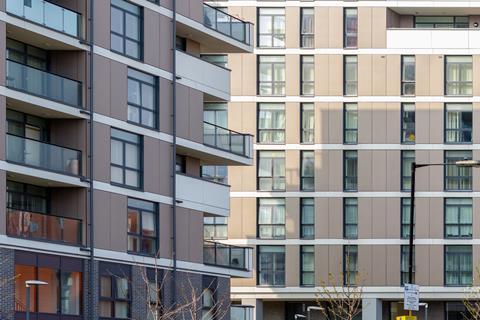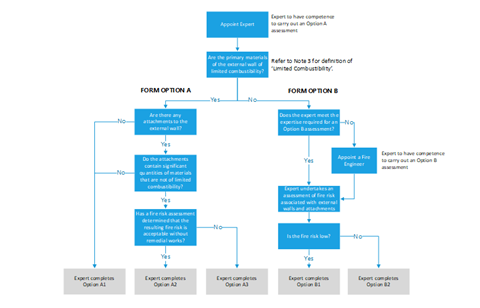Service seeks to standardise valuations across high-risk housing stock
A new valuation service for those looking to buy, sell or re-mortgage homes in high-risk tower blocks should “unclog” a market paralysed by fears over the costs of dealing combustible cladding material, according to RICS.

The programme, created by RICS, the Building Societies Association and banking industry group UK Finance, aims for a consistent classification of cladding systems on high-risk residential towers, effectively those over 18m – or six storeys – high.
It follows the government’s ban on the use of combustible material in the external walls of new residential buildings over 18m following the Grenfell tower fire in June 2017.
The service includes an External Wall Fire Review under which every building will need to be assessed by a fire safety expert every five years.
The institution said building owners would be encouraged to “proactively pursue independent testing of external wall materials to safely speed up the process for buyers and sellers”.
News of the valuation service comes months after the government threatened to name and shame owners of high-rise residential buildings who do not remove dangerous aluminium composite material (ACM) cladding.
Official figures suggest that more than 300 high-rise residential and publicly-owned buildings in England feature cladding systems unlikely to meet building regulations.
Government data suggested that, at the end of last month, 93 high-rise residential blocks with ACM cladding in the social sector and 175 such buildings in the private sector had been identified as yet to be remediated. There are also concerns over the fire performance of buildings fitted with high-pressure laminate cladding panels following a fire at a student block in Bolton last month.
Concerns over the risk posed by the presence of flammable materials in high-rise residential cladding systems has led surveyors to value homes at well below their market value, or in some cases at zero.
John Baguley, tangible assets valuation director at RICS, said the new service would ease issues in the market.
He added: “To unclog areas of the market, a qualified and experienced fire safety expert will be appointed by the building owner to provide a report on the building’s cladding and associated wall system as an additional part of the valuation process. This will ensure safety and will also ultimately allow the high-rise property market to function properly.”
Simon Rawlinson, a partner at consultant Arcadis, described the valuation service as a positive and pragmatic move for those living in flats that could have issues with their cladding. He said: “Given the position some people have found themselves in, with properties they can’t sell, this approach could be a good thing.
“At buildings of six storeys and above, we’re talking about a very big chunk of urban housing where the market has been frozen. The hypothesis is that most buildings are safe, but you don’t know until you’ve checked them.
“If there is found to be no problem, crack on [and sell]. If there is, get on with the remediation work.”
The cost of the assessments could be spread across leaseholders’ service charges, Rawlinson said.
Welcoming the new valuation system housing secretary Robert Jenrick said resident safety was of the “utmost priority” and he called on building owners to follow expert advice and ensure that any building safety and fire risks were “identified and fixed as a matter of urgency”.
Housing Today asked RICS how the new valuation service would work…
How will the proposed fire experts be appointed and who pays for their time?
“A building owner, as the responsible party, should be able to confirm what materials are on the building. This process/form is a set way for them to confirm to valuers acting on behalf of mortgage lenders that an external wall system has been assessed by a suitable expert. The consumer should ask their building owner or their representative to ensure the assessment is carried out. Building owners and managing agents have been involved in the development of this process/form and have indicated that they are willing to do this.
“The cost will vary according to the commercial contract with the expert filling in the form. The building owner or their representative is responsible for instructing that expert and will bear the cost of doing so (which may be passed on to leaseholders within the building). Surveyors and lenders cannot control whether a building owner passes on the costs. The government has indicated that they do not expect individual homeowners to face bills for the remediation of buildings found to be a fire risk.”
Are there enough people with the expertise to carry out such assessments?
“The process/form has been deliberately designed to ensure that there is enough potential expertise to carry out the assessment. There are two options on the form: option A, where external wall materials are unlikely to support combustion and option B, where combustible materials are present in external wall. A larger group of professionals will be able to confirm option A by identifying the materials on the external wall. Where combustible materials are present a more detailed review by a professional of a higher level of expertise will be required. The EWS form must be completed by a member of a relevant professional body within the construction industry with sufficient expertise to identify the relevant materials within the external wall and attachments and whether fire resisting cavity barriers and fire stopping have been installed correctly.

Source: RICS
“However, this would not necessarily include the need for expertise in fire engineering. RICS will be publishing a list of bodies recognised as operating in the built environment. This list is not exhaustive, nor does it constitute an endorsement or approval from RICS and other bodies with relevant expertise may be able to assist but it may provide some assistance when choosing a professional to carry out the assessment. Anybody instructing an EWS form must be satisfied that the signatory meets the requirements as described above.”
Will this valuation service require – or will RICS be calling for – reform of what is deemed ‘limited combustibility’?
“This is process which reflects that at the moment no assurance or information exists to confirm that an external wall system includes combustible material. Building regulations came into force in December 2018 which bans combustible materials in some properties but there is existing stock with external wall systems which may or may not contain materials which need replacing. Safety of occupation and accurate valuation and condition advice is essential and this process will ensure consistency in approach and clarity about what to request and what must be provided.”











No comments yet